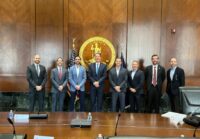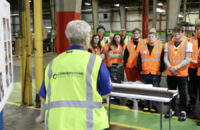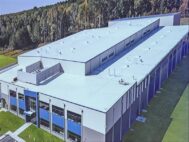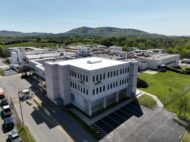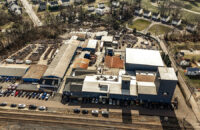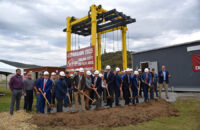Eaton to invest $50M in Henrico expansion, adding 200 jobs
Eaton will invest over $50 million to expand its existing manufacturing footprint in Henrico County and create 200 jobs.
Manufacturer to invest $4.9M in Franklin County expansion
Cornerstone Building Brands will invest $4.9M to expand its Franklin County manufacturing campus, adding 50 jobs and boosting capacity.
HII investing $28M for Hampton manufacturing facility
Newport News-based Fortune 500 contractor Huntington Ingalls Industries is investing $28 million to create an aircraft carrier and submarine manufacturing plant in Hampton, the city's mayor said Wednesday.
Modine announces $19.6M Buena Vista expansion
Modine will relocate its heating division headquarters to Buena Vista, Virginia, investing $19.6 million and creating 57 new jobs.
Defense contractor to add 288 workers at Roanoke night-vision goggle factory
Elbit Systems of America will invest $30 million to expand its Roanoke County manufacturing facility and create 288 jobs.
Culpeper manufacturer Bingham & Taylor acquired
Charlotte Pipe and Foundry has acquired Culpeper-based Bingham & Taylor, a manufacturer of underground infrastructure access solutions
US Steel details plans to invest $11B by 2028
U.S. Steel and new owner Nippon Steel unveiled an $11 billion plan to modernize facilities and boost efficiency, aiming to protect 100,000 U.S. jobs.
Modular housing manufacturer to hire 89 in Southwest Virginia
A modular housing production facility that will create 89 jobs within five years will soon come to Russell County.
VFP investing $35M to expand Scott facility
VFP will invest $35 million to expand its Scott County facility, doubling capacity and creating 200 manufacturing jobs.
AstraZeneca to invest $4.5B in Albemarle manufacturing plants
AstraZeneca will invest $4.5 billion to establish two new manufacturing facilities in Albemarle County and create 600 direct jobs.
Lego’s $1B Chesterfield facility nears 35% completion
The Lego Group’s $1 billion facility in Chesterfield County is nearly 35% complete, said Lego Manufacturing Virginia General Manager Jesus Ibañez.
Dover Food Retail to add 300 jobs in Chesterfield
Dover Food Retail will soon invest over $20 million to expand its Virginia operations, adding 300 jobs in Chesterfield County.


